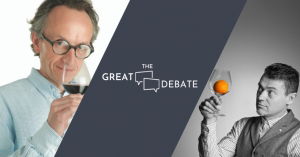BLOG
Debate
Summary:
Did you enjoy reading our Great Debate blog on The Future of Appellations by Andrew Jefford and Robert Jospeh?
We followed up their written debate with a WSG Live episode and encouraged participants to share their opinion or ask their questions directly to Robert and
Wine is full of spirited debates, but few can argue that any subject matter generates more intensity these days than natural wine. Should sulphur be allowed or not? Do natural wines reveal terroir better than conventional wines? Has natural wine changed our notion of flaws?
Perhaps most controversial of all is the definition of natural wine in the first place.
These questions are constantly challenging everyone from wine critics and sommeliers to casual students of wine. We decided to bridge the topic with long-time columnist for Decanter and World of Fine Wine, Andrew Jefford, as well as Simon J Woolf, the noted natural-wine writer and author of Amber Revolution: How the World Learned to Love Orange Wine.
Few consumer products in the world are more steadfastly focused on origin than wine. Think of the last great bottle of wine you enjoyed and, odds are, its place of origin featured prominently on the label.
Known as appellations, these defined areas of wine production have fostered a fanatical faithfulness to origin across the industry. Whether it is a Chianti Classico or a Chambolle-Musigny, a Napa Cabernet Sauvignon or a Chenin Blanc from Stellenbosch, how we interpret wine often comes down to how we interpret the place of origin.
While the general concept around the world is the same, the approach certainly is not. In the European sense, appellations define not only the boundaries of a region but the permissible production of wine (including grape varieties, yields, winemaking techniques and more).
“It is better to call non-European systems of this sort ‘Geographical Indications,’ since outside Europe it is generally only a producing zone which is defined,” says wine journalist and critic, Andrew Jefford. “Grape varieties and production methods are left up to the producer, and are a matter of free choice.”
Studying the differences and similarities among appellations, as well as their traditions and modifications, can lead to a lifetime of enjoyment — or frustration.
“The tail is vigorously wagging the dog,” says wine writer Robert Joseph, who is also a producer and wine analyst. He notes that too many places lack the distinction required to make appellations practical, useful and relevant to today’s consumer. Add in the not-so-little wrinkle of climate change, and the very purpose of appellations going forward becomes a rousing debate.
So: are appellations too “rooted to the spot” to be useful in a changing world? Or do they still offer producers the best chance to market their wines on a crowded global marketplace? We sat down with Andrew Jefford and Robert Joseph and hashed it out.



